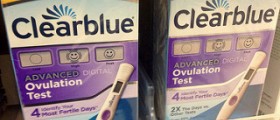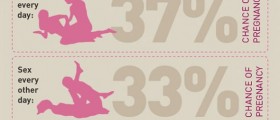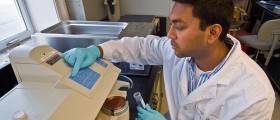
Women are capable of conceiving beforethey enter their menopause. Thus, since the time they become fertile,until the time their organism stops producing new eggs, they shouldbe capable of having children. However, there are times of themenstrual cycle when women are more fertile that at some other times.
Thus, through careful calculations andgood organization in terms of family planning and following one'sbiological clock, every fertile woman can get pregnant more easily.
Menstrual Cycle and Fertility
Basically, about 30% of all women havetheir fertile period between the 10th and the 17thday of their menstrual cycle, according to the researchers who workat the National Institute of Environmental Health Sciences. Theresearches which proved this were conducted on women aging from 25 to35, being in their prime age for getting pregnant. Teenagers andwomen approaching menopause are not considered to be as reliable, interms of their fertile and infertile days of the menstrual cycles.
However, biology of women does notfollow this specific pattern in all cases and women who usecalculations of their fertile and infertile days as a birth controlmethod should rather opt for some other means of contraception sincethey can easily become pregnant even if this is supposed to beimpossible.
Simply, health experts recommend thatcouples who desire to get pregnant should not worry about thefertility in the menstrual cycles of the women. Rather, they shouldsimply engage in unprotected sex for about 3 times a week, until thesigns of pregnancy occur.
Furthermore, some researches have shownthat about 70% of the women undergoing testing were fertile evenbefore they reached the 10th day of their menstrual cycle.What is more, their fertile window was opened as soon as on thefourth day of this cycle.
However, in some other cases, women whohave regular and precise menstrual cycles were found to have 1 to 6%chances of getting pregnant on their infertile days, even on the daywhen their menstrual cycle is about to begin.
The same way, having sex on fertiledays of the menstrual cycle does not guarantee that a woman willbecome pregnant. We need to take the condition of the partner's sperminto consideration, along with many other factors such as thecondition of the egg, the receptivity of the uterus etc.
An interesting piece of data on thiswhole matter lies in the report of a doctor who worked during theWWI. Namely, this German physician reported that about 25 pregnanciestook place from a single sexual intercourse, during the soldiers'leaves home, taking place between the day 2 and day 30 of themenstrual cycles of their partners. Today, about 8 decades later, thechances of women getting pregnant during various stages of theirmenstrual cycle are almost the same, being more or less random.
Fertility before Menopause
Many women, men and experts in thefield of health claim that the fertile age of every woman ends withher menopause. Simply, they say that a woman cannot possibly getpregnant once her menstrual periods stop occurring. In most cases,all these individuals are absolutely right.
However, we need to bear in mind thatmenopause is a gradual process which does not make women infertileovernight. Rather, there are stages to this point of female existenceand fertility. Therefore, being in menopause and going through theprocess of menopause are not the same notions.
In fact, perimenopause, thetransitional period between the end of menstrual cycles and the onsetof menopause can last for more than 6 years. Usually, this periodappears after the year of 40, starting with the transition, lastinguntil the age of 50, when real menopause commonly takes place. So,simply enough, real menopause makes it impossible for you to getpregnant. Nevertheless, all the transitional stages which appearprior to this stage leave small chances of pregnancy existent.
Bear in mind that women are mostfertile during the 20s, until the mid 30s. By the end of their 30s,the fertility of women decreases significantly, getting graduallyless as the years go by, commonly disappearing completely after theage of 51. Biology functions this way, since women are born withabout 2 million eggs at their disposal, only 100 of these remainingduring the last stages of their menstrual cycles. Regardless, eventhese last eggs can result in pregnancy, be it planned or unwanted,if adequate contraception methods are not used.
All in all, fertility decreases withage. However, the menstrual cycle of many women cannot be trustedenough to serve as a method of birth control. So, rest assured that,even when you reach the end of your menstrual cycles, approaching the5th decade of your life, there are still chances ofconceiving. Thus, if you do not desire this, be careful.

















Your thoughts on this
Loading...